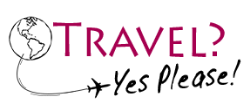Hustled and Hassled in Havana
Purchases made through links earn us a small commission, at no extra cost to you.
After an eventful first night in Havana, I woke up the next day excited to begin exploring the city. I couldn’t wait to ride in a classic car, admire the architecture, and experience the local culture.
After breakfast we hopped in a beautiful 1951 Chev and had the driver take us to Plaza de la Catedral. It would be here, in a beautiful, historic square, that my enthusiasm for Havana would slowly start to die.

Hassled in Havana
As soon as we set foot in the Plaza, a tour guide approached us. He was very friendly, asking us questions about ourselves and where we were from. After nearly five minutes of small talk, he began to pitch us his tour, pulling out a laminated map of all the main sites he would take us to.
“We just got here and want to explore on our own for a little while,” we explained as we started to move away.
He tried a little longer to convince us but eventually said, “Okay, well I’ll be here if you change your mind.”
I started taking some pictures of Catedral de San Cristóbal and the surrounding square, but was soon interrupted by the tour guide. He was following us around, telling us little tidbits about what we were looking at.
Again, we rejected his offer for a tour. He was very knowledgeable and personable, but I really just wanted to look around and take some photos, uninterrupted.
The man let us be, but would approach us again shortly after. He was a nice a guy, very social and somehow managed to seem non-aggressive, even though he had approached us at least four times now. It was exhausting to keep having to say no, especially to someone who was trying to be helpful.
Old Havana would be like this All. Day. Long.
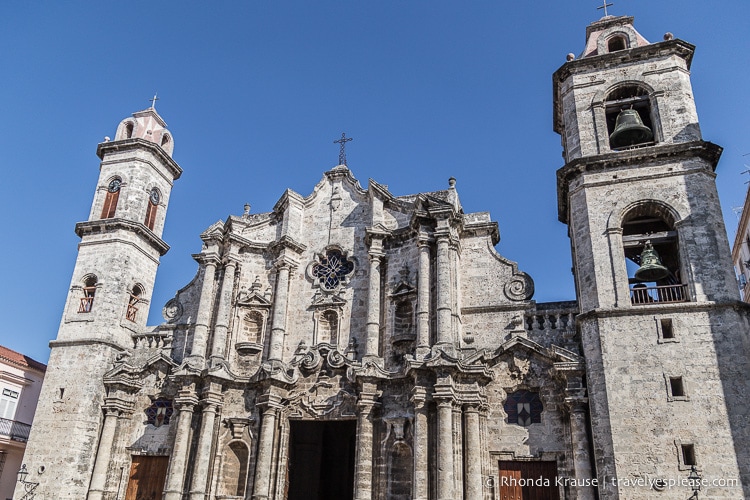
Everywhere we went people were asking us for things. It wasn’t just to take their tour, ride in their cab, or buy their CD. They started asking us for other things, things I had never been asked for before.
What was unique about Havana, is that the people weren’t asking us for money. They were asking for basic items like toothpaste, soap, shampoo and deodorant. I had heard that in Cuba these items are hard to find in stores, and when they are available can be very expensive. We came prepared with small toiletry items to give away, but in our rush to explore, forgot them at the hotel our first day.
Still, there was no escaping the constant hounding in Old Havana.
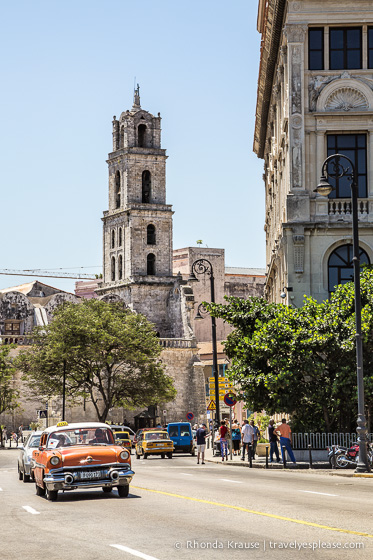
Even in a museum, we were hassled by the staff. We tried to look around Castillo de la Real Fuerza, but every time we entered a room, the bored staff member sitting in the corner would approach us and ask for things.
One staff member pulled us into a corner, out of view of the security cameras, so she couldn’t be seen talking to us. She asked for several personal hygiene items and was really surprised when we didn’t have a “present” for her. She said Canadians are very generous and usually bring stuff to donate. Then she started tugging at Mike’s shirt asking if we had one for her. This really put me off and was the first time I felt that maybe tourists were being taken advantage of, that the generosity had come to be expected.
By this point I was well aware that the Cubans are in need of things, but I was getting frustrated that even in a museum we couldn’t escape the constant badgering. We remained polite and spent a lot of time listening to this lady’s story, but it was draining to have to keep saying we couldn’t help her. Making things even more awkward, she followed us around for the rest of our visit.
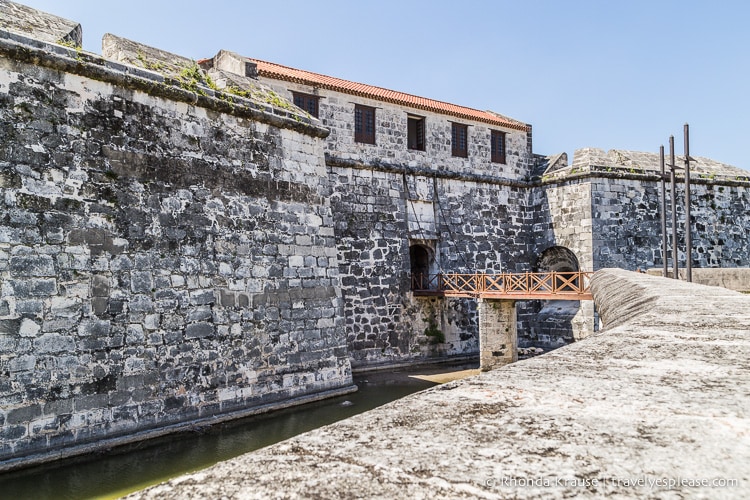
Finding it Hard to Say No
What made it hard to say no to the people in Havana, was that they weren’t asking for money. They were asking for simple things that we North Americans take for granted- soap, toothpaste and milk.
Another reason it was tough to say no, was that the people who approached us acted like they wanted to be our friend. They would strike up a friendly conversation, ask questions about ourselves, tell us interesting things about Cuba, and give us helpful advice. Just as the conversation got comfortable, we’d get asked for something.
It was hard not to feel disappointed all the time. First and foremost, I was disappointed that the Cuban people had to ask for basic necessities to begin with. It was eye opening and made me feel very lucky to live in Canada. Next, I was disappointed that we couldn’t do more to help. We helped as much as we could, but there was only so much we could do. Lastly, I was disappointed that people we thought wanted to be our friend, really just wanted something from us.
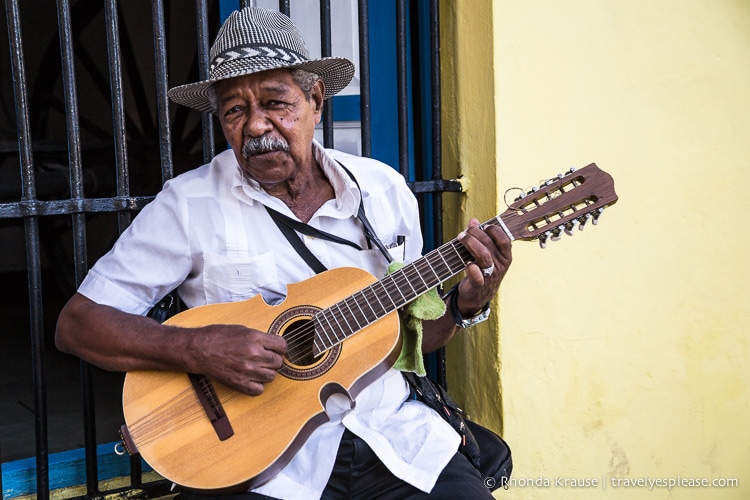
The Havana Hustle
In Plaza Vieja, we stopped to look at our guidebook when a man approached us.
“Can I help you with something? I’m Cuban. I know my country.”
“No thanks. We’re just trying to decide where to go next,” I said.
The man continued conversing with us, asking the usual “Where are you from?” and “How do you like Cuba?”
He then began telling us about a salsa dance school where his wife teaches and his daughter dances.
“It’s just up the road that way,” he pointed, “And it’s free.”
“Okay, we’ll go check it out,” I replied because I love to dance.
We said goodbye and then started to walk off in the direction he pointed us. About a block later, the man had run to catch up with us. We now, unintentionally, ended up with our own personal, unofficial tour guide.
This man took us down a ripped up street where there was barely a sidewalk to walk on. We were definitely away from the tourist zone, in an area where the locals lived and worked. As run down and grungy as it was, we were excited to be seeing a more “real” side to Havana.
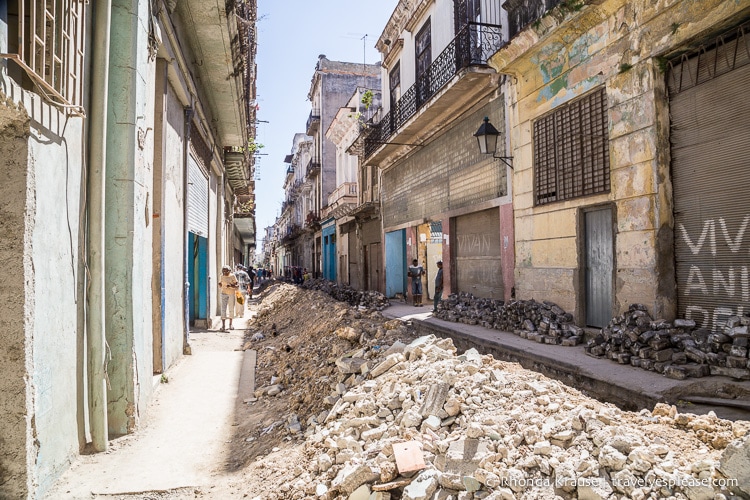
The first place he showed us was a ration shop where the locals go to collect their government allotted food and cooking supplies for the month. It was April 1st, so the line up was long. The man took us into the dark, sparse shop. On the wall was a blackboard listing the products, prices and limits per person.
The man wanted me to take a picture of the store, but I refused. As great as a photo would have been for the blog, I honestly wasn’t comfortable taking a photo. It felt disrespectful, insensitive. This is how people live- I didn’t want to treat it like a tourist attraction.
After leaving the shop, we continued down the street as our new friend told us about Havana and life in Cuba. A short while later we arrived at the dance school. He showed us some photos on the wall of the different dance classes, pointing out his daughter in one of the pictures.
The place was different than I expected. Since it was a dance club, I thought we’d be seeing some actual dancing, maybe even have the opportunity to do some salsa dancing myself. Turned out we really were just taken to a cafe in the same building as a dance school. It was fine, I guess- there was a live band and it was nice to get out of the heat and enjoy a cold drink.

Sitting at the table we continued to have quite a good conversation with our new friend. It was fascinating to get an insiders perspective about life in Havana and I was feeling lucky to have had this experience. Then the conversation began to shift.
“Today is an important day,” he began, “It’s ration day.”
“Do you want to buy some cigars?” he asked Mike.
“Yes, I was planning on buying some cigars,” Mike answered.
“I can take you to a place. If you buy cigars from my friend, I get an extra ration for the month.”
“Yeah sure, we’ll go with you to your friend’s store,” Mike answered as my instincts started to tingle with suspicion.
I really did not want to go anywhere else with this guy, especially now that he was asking for things. I think Mike was intentionally avoiding my gaze because he knew I was giving him “the look”, my way of saying let’s get on with our day.
I had no choice but to tag along as this man took us to buy some cigars. Not long after we left the dance school, a policeman stopped us. He pulled aside the man we were with and began to have words with him. Our friend pulled out a bunch of ID cards to show the officer, all while telling us to wait for him and “Don’t worry. Everything’s fine.”
I’m not sure why the policeman stopped him, but he let him go after inspecting his ID cards. So, we continued on down the street.
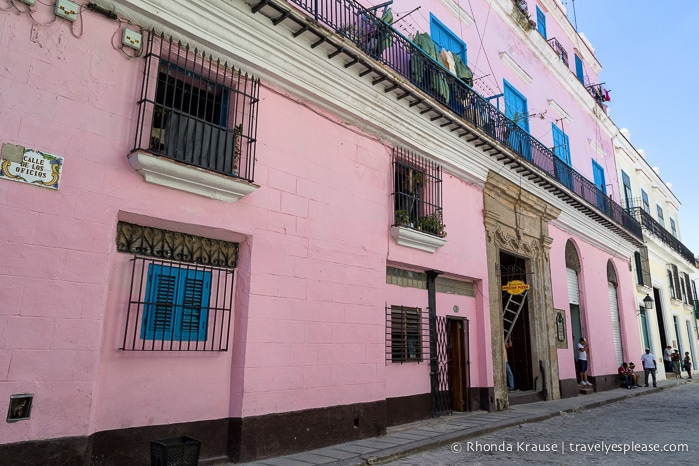
All of a sudden the man said “Here. Come over here,” motioning us to a door.
He was looking around as if he didn’t want to be seen leading us into this building.
“Is this your house?” I asked.
“No. Quickly, inside,” he bluntly ordered.
Before I knew it, Mike was inside looking out at me still standing on the street.
“No.” I said.
“Just come in,” Mike urged.
As I walked into the house, all sorts of terrible thoughts flooded my mind. For a brief second, I pictured us being held up, beaten and robbed.
As the door slammed shut behind me, I saw the man turn the lock.
He must have saw the concern on my face because he kept insisting, “It’s okay, Cuba’s safe.”
To the right of me, I saw a small table with some boxes of cigars on them. I relaxed a little bit once I saw this, but was still trying to piece together just where we were. It looked like we were in someone’s living room, but there was a curtain partially blocking off a back room that had some people milling about. I didn’t know if this was a store, or a house, or what it was.
A lady came quietly out from behind the curtain. She too must have sensed our uneasiness, repeating, “Don’t worry. It’s safe.”
The man handed her some sort of documents, which she took back behind the curtain. She then reappeared, approached the cigar table and began showing us the different boxes. The four of us started some intense negotiations and eventually agreed upon a price for a box of 25 Monte Cristo number four cigars. She packed them up for us and then we were quickly ushered out of the house. Our new “friend” practically shut the door on us!
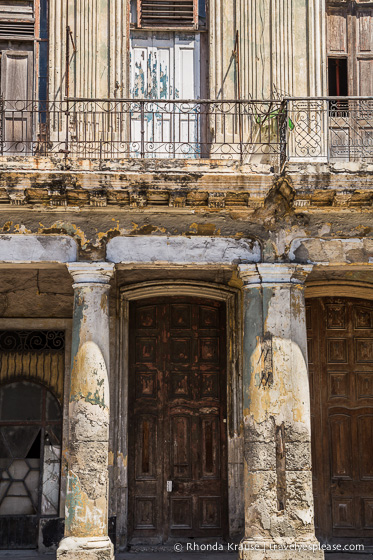
“Well, I guess he’s not our amigo anymore,” I said as we headed back to the tourist part of Old Havana. As Mike and I debated the legitimacy of the cigars and laughed about what a crazy morning we’d just had, we could hear our friend calling behind us, “Mike. Wait up.”
“Not again,” I thought.
“Mike. Because you only paid 40 for the cigars, I just got rice. I didn’t get my full rations,” he explained. “Please can you buy me some milk. For my daughter.”
“No way!” I blurted out. “We got you an extra ration, that was the deal.”
“I just need some milk. For my daughter,” he pleaded, a sad look on his face.
He was definitely pulling on Mike’s heart strings, because Mike whispered to me, “I won’t be able to sleep at night.”
So, off we went, following this man to a store where we could buy some milk.
Upon entering the store, I was relieved that it actually looked like a real shop. The man took us to the counter and asked the cashier for one month’s ration of milk. She turned to the shelf behind her and began pulling off bags of powdered milk. One…two…three bags of milk were put into the grocery bag. At the till she rang up a price of 17.50 CUC.
“17.50!” I exclaimed, starting to feel taken advantage of. “No way!”
I pulled out one of the bags, annoyed that our “friend” had been so presumptuous. “How much for two?”
It was still more than I wanted to pay, so I pulled out another bag. “How much for one?”
The lady pressed some buttons on the till, and up popped a price of 5.75.
“Okay. We’ll buy one.” I said firmly.
We gave the lady our money and handed over the bag of milk. The man thanked us and we hurried away, never to see him again.

Confused and Conflicted
At first I felt okay about the whole cigar situation we got ourselves into. Mike got his cigars, our friend got his rations, and we all have a good story to tell. But the longer I thought about it, the more uneasy it made me feel. Don’t get me wrong, I’m glad we could help this man in a small way. The money we spent was insignificant to us, but probably made the world of difference to this guy. However, I couldn’t shake the feeling that maybe we were played the fool.
That night at the Tropicana, we started to tell this story to another couple at our table. Turns out almost the exact same thing happened to them! Now we really felt like we were scammed!
As a tourist, it’s sometimes hard to know someone’s motivation for engaging in conversation with you. Was it that these people really just wanted to talk and be friendly, later feeling comfortable enough to ask for what they needed? Or did they approach us with the intent of asking for things all along?
Mike put it really well by saying, “I guess in Havana, no one is your friend for free.”
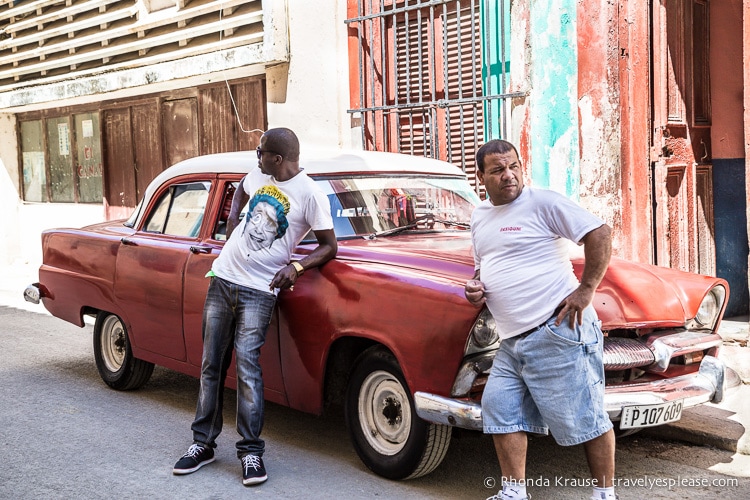
When we started to pay close attention, Mike noticed that all the women who were asking us for things, were wearing makeup, had their hair done nicely, sometimes even with highlights. They were dressed reasonably well- nothing fancy, but their clothes weren’t dirty or tattered. The man we bought milk for was actually dressed very well, in clean dress pants and a buttoned up shirt.
We began feeling internally conflicted- these people didn’t look “needy”, at least on the surface. Back home, it’s easy to tell which people on the street are living without life’s basic necessities. Their clothes are old, their hair is dirty and their body doesn’t look healthy. We did see a few cases like this in Cuba, but in our experience, these weren’t the people who were asking us for things.
Why? Why are they asking us for stuff? How can they have makeup, but no toothpaste? How can they have nice clothes, but no deodorant? Why was everyone asking us for milk? They get food rations, why don’t they get milk?
It didn’t make sense to us because we come from a far different world. We were in Havana for just a few days, so we can only make assumptions, but the best explanation we could come up with was this: Everyone wants a piece of the pie. People will always want more.
We can’t judge or blame these people for wanting the things that we, in North America, attain so easily. The people in Havana see us walking around their town, not a care in the world, with easy access to all the toothpaste, soap and shampoo we need back at the hotel. I kept thinking, it must be hard to see people come to your town who essentially “have it all”, and know that you are not afforded the same luxuries and freedoms.
Truthfully, if we were in the same situation, we would probably want what the tourists have too. I think it’s only natural. It’s hard to say if we would be so upfront and ask for things the way they do in Havana, but we would definitely be wanting more. Heck, even in our privileged society, people are always wanting more. It’s not enough to have a house- people tend to want a bigger house, a newer house, a house with more amenities.
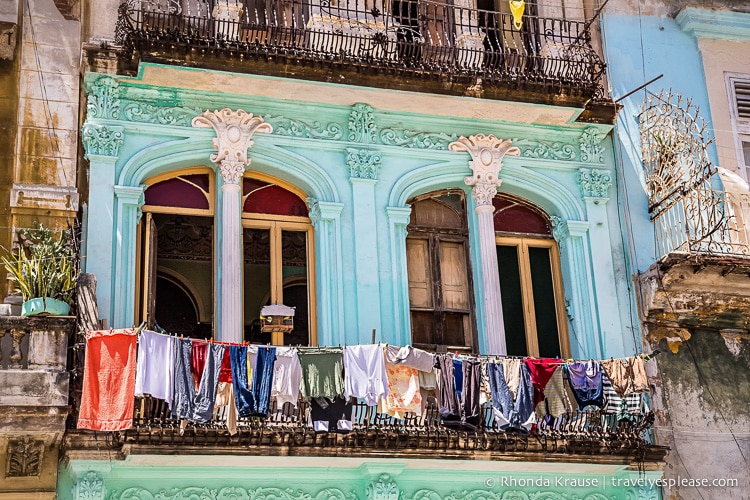
Looking for Answers
A few days later on our bus ride to Varadero, we had a very knowledgeable guide who lived in Cuba her whole life. As she talked, a lot of our questions about Cuba were answered. Here’s a rundown of what she said:
- For the rations, people get rice, beans, sugar, salt and cooking oil. Each month, they are given one leg of chicken per person. Children under seven are provided with one litre of milk a day. A special diet is designed for pregnant women and diabetics.
- The food rations are not enough to last the month, but people are able to buy more, if they can afford it.
- At the time of our visit, Cuba had a dual currency system. Cubans were paid in pesos, but could only use them for certain things like public transportation and paying utility bills. For many other things, the convertible peso (which is what tourists use) was required. Approximately 24 pesos= 1 convertible peso. (Update: Cuba no longer has two currencies and now uses Cuban pesos only).
- The average salary is around 350 pesos a month. In a family, both the husband and wife need to work, sometimes two jobs, just to get by.
- A lot of University educated people quit their jobs to work at hotels. The salaries are not very big, but the tips and gifts they get from tourists make up for it.
- The reason why people are asking for toothpaste and deodorant, is because these products can’t be found in stores right now. It used to be that soap and shampoo weren’t available, but now they are. Our guide didn’t know why personal hygiene items are often not in stores.
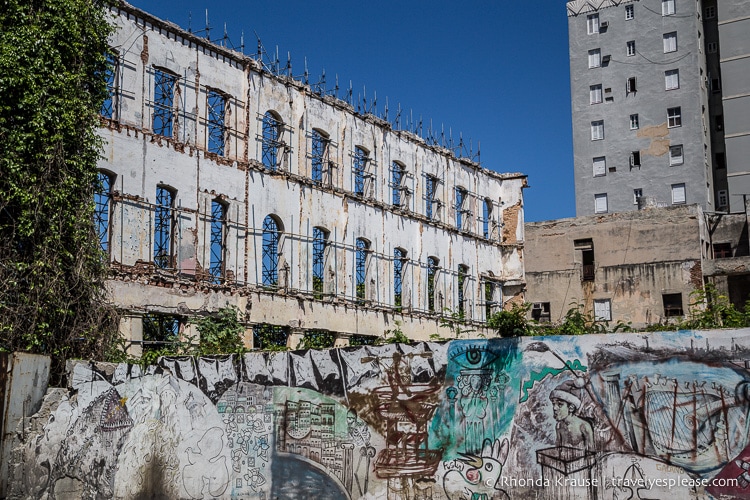
We decided to tell our guide about the guy we bought milk for. We wanted to know if we had helped someone in need or been scammed. This is what she said:
- Cuban people are not proud of what goes on in Havana (in reference to how they pester tourists for things). She said the people who do that are making fun of tourists and it’s not like that elsewhere in Cuba.
- If you want to give to people, give to those who are gracious and don’t ask for anything.
- We didn’t get scammed on the price of milk- it should have cost 5.75 CUC. However, there is a scam that’s run near the Capitolio, which is to take tourists to a store and charge them 20 CUC for one bag of milk. (Update: Since the convertible peso is no longer used, prices in Cuba will now be in Cuban pesos/CUP).
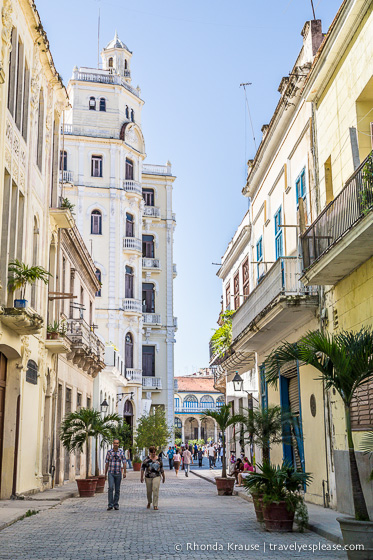
Final Thoughts About Havana
Our 3 days in Havana were exhausting. I started out very enthusiastic about the city, and we did have fun, but it quickly ran me to the ground.
It’s extremely difficult to say no all day long, especially to friendly people you do wish you could help. We tried not get frustrated, but after a while that’s how we started to feel. On our third and final day, we didn’t even leave the hotel. I didn’t want to be asked to take a taxi, or a carriage, or a tour. I didn’t want to be asked to buy milk or anything else. I felt overwhelmed and didn’t want to be hassled in Havana anymore.
Havana is the first city I quit on. I just gave up. And I never give up when I travel. I stay active all day and late into the night, trying to get the most out of my trip. But Havana wore me down. What was supposed to be a relaxing vacation had become a stressful experience- one that confused me rather than leaving me feeling happy and relaxed.
Havana, and Cuba in general, is a place that left me with a lot of questions, more so than any other place I have visited. Usually when I travel to a country, I come home with a somewhat good understanding of the culture, lifestyle, history etc. But Cuba left me with more questions than answers.
For weeks after our trip I could not stop thinking about our visit. I wanted to know more about the regime, the way of life, and the conditions in which people live.
Since we’ve returned home, I’ve been doing a lot of research about Cuba, trying to find explanations for what we saw/experienced during our short time there. It’s a complicated country, both in regards to its history and present situation. Is the communist government to blame? The US embargo? There are a lot of factors at play and there is no easy answer. I can’t claim to know much about the politics surrounding Cuba after one short trip. However, what I do know is that things are slowly changing, and they appear to be changing in a positive way, allowing Cuban residents more freedoms.

Should You Visit Havana?
Yes! I don’t regret going to Havana at all. It was definitely worth seeing and we did have a lot of fun. I loved the music, the architecture, the colours, the cars. Even the people, as frustrating as some were at times, were always very friendly, kind and helpful.
I don’t, by any means, consider our experience in Havana to be a bad one. Yes, it was a little stressful, but that’s because I chose to spend my time wondering “Why?” about everything.
As nice as it is to have a relaxing vacation, I think it’s important to learn about the country you’re visiting. I’m glad we had the experience we did, even though it was uncomfortable at times. It helped put things in perspective and we came home much more appreciative of the life we have in Canada.
Our hope is that one day, the lovely people of Cuba get to experience the same freedoms and comforts that we are lucky enough to enjoy as Canadians.
More Cuba Travel Guides
- What to Expect on Your First Trip to Cuba
- Fortaleza de San Carlos de la Cabana- Visiting Havana’s Mighty Fortress
- Getting to Know Trinidad- Colonial Architecture and Colourful Charm in Cuba
- Parque Marti- The Historic Heart of Cienfuegos
